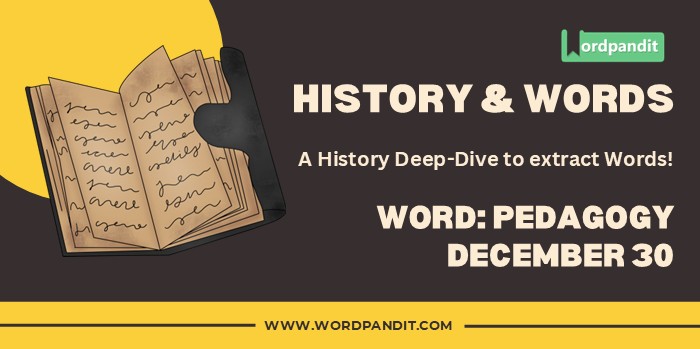History & Words: ‘Pedagogy’ (December 30)
Welcome to ‘History & Words.’ 🌟 I’m Prashant, founder of Wordpandit and the Learning Inc. Network. This series combines my passion for language learning with historical context. Each entry explores a word’s significance on a specific date, enhancing vocabulary while deepening understanding of history. Join me in this journey of words through time.
📚 Table of Contents
🔍 Word of the Day: Pedagogy
Pronunciation: /ˈpɛdəɡɒdʒi/ (PED-uh-goj-ee)
🌍 Introduction
On December 30, 1916, the assassination of Grigory Rasputin marked the end of a controversial figure whose influence extended into Russian royal education. While Rasputin is often remembered for his mystical influence over the Romanov family, his involvement in educational reform efforts provides a unique lens through which to examine the role of pedagogy in early 20th-century Russia.
The word “pedagogy” encompasses the theory and practice of education, representing the art and science of teaching. It reflects humanity’s ongoing quest to understand how best to transmit knowledge and cultivate learning.
This concept has evolved throughout history, shaped by cultural values, political systems, and scientific understanding of how people learn.
🌱 Etymology
The term “pedagogy” derives from the Greek “paidagōgos,” combining “paidos” (child) and “agōgos” (leader). In ancient Greece, a pedagogue was literally a slave who led children to school. Over time, the meaning evolved to encompass the broader theory and practice of teaching.
📖 Key Vocabulary
- 🔑 Didactic: Intended to teach, particularly in a moral or instructional way
- 🔑 Curriculum: The subjects comprising a course of study
- 🔑 Methodology: The systematic study of teaching methods
- 🔑 Andragogy: The method and practice of teaching adult learners
🏛️ Historical Context
Ancient civilizations developed various approaches to education, from the Socratic method in Greece to Confucian teaching practices in China.
The Middle Ages saw education primarily controlled by religious institutions, with monasteries and cathedral schools establishing teaching traditions that would influence education for centuries.
The Enlightenment brought new perspectives on education, with philosophers like Rousseau advocating for child-centered learning approaches.
⏳ Timeline
- 387 BCE: Plato founds The Academy
- 1088: University of Bologna established
- 1762: Rousseau publishes “Emile, or On Education”
- 1837: Froebel establishes first kindergarten
- 1916: Rasputin’s death affects Russian education politics (December 30)
- 1919: Waldorf education begins
- 1967: Paulo Freire publishes “Pedagogy of the Oppressed”
- 2001: No Child Left Behind Act in US
🌟 The Day’s Significance
December 30, 1916, while primarily remembered for Rasputin’s assassination, represents a moment when educational reform intersected with political power. Rasputin’s influence on the education of the royal children reflected broader debates about pedagogy in pre-revolutionary Russia.
This period highlighted tensions between traditional Russian educational methods and modernizing influences from Western Europe.
The event underscored how educational philosophy often becomes entangled with political and social movements.
💬 Quote
“Education is not the filling of a pail, but the lighting of a fire.” – William Butler Yeats
🔮 Modern Usage and Reflection
Today, “pedagogy” encompasses diverse teaching methods and philosophies, from traditional approaches to innovative digital learning strategies.
The COVID-19 pandemic has accelerated discussions about educational technology and remote learning, prompting renewed examination of pedagogical practices.
🏛️ Legacy
Historical approaches to pedagogy continue to influence modern education, with many contemporary teaching methods building on centuries-old foundations.
The ongoing debate between traditional and progressive educational methods reflects enduring questions about the nature of learning and teaching.
🔍 Comparative Analysis
While traditional pedagogy emphasized teacher-centered instruction, modern approaches often focus on student-centered learning and personalized education, reflecting evolving understanding of how people learn.
💡 Did You Know?
🎓 Conclusion
Pedagogy remains a dynamic field, continuously evolving as our understanding of learning processes grows, while maintaining connections to its rich historical foundations in human civilization’s quest for knowledge transmission.
📚 Further Reading
- 📘 “The History of Educational Pedagogy” by Robert R. Rusk
- 📗 “Understanding Pedagogy: Developing a Critical Approach” by Peter Mortimore
- 📙 “Pedagogy of the Heart” by Paulo Freire














